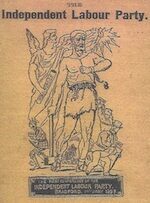Beginnings in Bradford
“The ILP grew from the bottom up: its birthplaces were those shadowy parts known as the provinces…When the two-party political system began to crack, a third party with a distinctively socialist character emerged…amongst the mills, brickyards and gasworks of the West Riding.”
Edward Thompson, Homage to Tom Maguire
It was no coincidence that the ILP’s founding conference was held in Bradford. The city and surrounding textile areas had a strong tradition of radicalism dating back to the early years of the industrial revolution.
 By the late nineteenth century, Bradford was one of Britain’s foremost industrial cities. Dominating its bleak skyline (as it still does) was Manningham Mills, employing 5,000 low paid, non-unionised workers, many of whom were women.
By the late nineteenth century, Bradford was one of Britain’s foremost industrial cities. Dominating its bleak skyline (as it still does) was Manningham Mills, employing 5,000 low paid, non-unionised workers, many of whom were women.
After issuing an 8 per cent dividend to shareholders, in December 1890 the millionaire mill-owner announced wage cuts of between 15 and 33 per cent. Not surprisingly, emotions ran high among the workforce and a strike was called.
The dispute exploded into a major confrontation which sharply divided Bradford opinion. The strikers faced hostility from many Liberals and Tories on the council, from the employers, the courts, the press and the police. Even the military were called upon to disperse one large public meeting.
But the strikers received strong backing and financial support from the local community, particularly from Bradford and Leeds-based socialists, as well as more widely. Between 60,000 and 90,000 people attended one of their mass meetings.
The dispute, which ended in the workers’ defeat, lasted five hard and hungry months. As a result, the strike leaders saw the need to have their own political party. In 1891, they set up the Bradford Labour Union. A year later this was followed by the Bradford Independent Labour Party.
Similar experiences led to the formation of dozens of local ILP’s elsewhere in the country, for example Colne Valley and Halifax in Yorkshire, in Manchester and Nelson in Lancashire, and in Newcastle in Northumberland.
In January 1893, some 120 delegates met in Bradford to set up the Independent Labour Party as a national party. George Bernard Shaw, the dramatist, attended on behalf of the London-based Fabian Society, but not without some controversy. The ageing Frederick Engels, the close associate of Karl Marx, welcomed the ILP’s formation.
The conference, chaired by Keir Hardie, was conducted in good spirits. After years of campaigning and debate, the Impudent Little Party, as its critics now described it, had been born.
—-
This is an extract from the original centenary edition of The ILP: Past & Present, published in 1993. The print version is now sold out.
The latest revised and updated version, published in 2023 to mark our 130th anniversary, is available to buy in two parts from our publications section.



16 September 2014
Like Christopher Bailey my great grandfather too, was involved with the establishment of the ILP. He was Edward (Ned) Walton of Farsley. I too would be delighted to learn of any records available identifying his input at meetings. Family stories refer to him and Frank Betts visiting one another’s homes in the late 20’s.
11 May 2014
Apols, meant 1893 delegates!
11 May 2014
My great grandfather Harold (Harry) Binns was closely involved with the establishment of the ILP in Bradford: does a list of the 120 1897 delegates exist, or records of membership from that time?